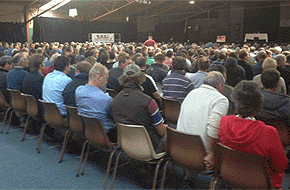
By Allan Barber
The recent meeting in Gore, organised by the Meat Industry Excellence Committee and attended by about 1,000 farmers, gave an overwhelming mandate for change to the present condition of the meat industry.
Key aspects of the Excellence Committee’s plan are one company controlling 80% of processing and marketing, a change in farmer supply culture, procurement equality and transparency, farmers to fund the restructure with assistance from the banks, and government backing.
This wish list may sound completely logical and comparatively simple, but it contains a number of assumptions, all of them very hard to achieve and some pretty unrealistic.
In the first flush of optimism after the meeting Gerry Eckhoff suggested the new structure could be in place by the start of next season in October. That is patently ridiculous because a wish list doesn’t equate to a workable strategy and business plan.
All components of the plan will have to be rigorously debated and tested in the next few weeks, while the Committee conducts its road show across the country.
Only when there is a national mandate for a plan which has the full support of farmers as well as meat companies will it be worth asking the government to give its backing for regulatory change. This will all take time.
There is an urgent need to take advantage of the groundswell of farmer opinion, as well as capitalising on the discussions behind the scenes by the meat companies which Owen Poole referred to at the Gore meeting.
But any plan must pass the sanity test and I can see plenty of reasons why this one doesn’t do that.
Meat industry values
The concept of one company with 80% of processing capacity and marketing sounds like a desire for the Fonterra model. But, as ANZCO Chairman Graeme Harrison says, there is one big difference – the Dairy Board handled virtually all dairy product marketing, so it was just a matter of achieving a merger of processing facilities in which only Kiwi and NZDG were involved after the spate of mergers and takeovers during the previous decade.
The meat industry which consists of cooperatives, privately owned large companies and single plant operators, all with their own sales and marketing arms, is not such an easy candidate for rationalisation.
The thought farmers should fund the restructure with help from the banks is not realistic. They would have to compensate the shareholders of the privately owned companies for their assets, as well as carrying the costs of rationalising their cooperatives. Owen Poole has estimated the cost at around $600 million.
The banks won’t leap at that proposal with any alacrity, especially as it would imply willingness to write down the overvalued assets in the industry. It is a truism to say a meat plant when closed is only worth the salvage value of the assets and the land minus the cost of remediation. Valuation as a going concern is all that supports current plant valuations on the companies’ books.
Farmer supply culture
A sea change in farmer culture, combined with transparency of procurement prices, won’t occur automatically.
This will only happen, if plant capacity and industry structure have been rationalised to the point where all companies are efficient with their own points of differentiation.
Government support
This leaves government backing. Apart from needing to see a plan which has the demonstrable support of the industry’s participants, the government will have to make sure it does not contravene any inter-governmental agreements or world trade negotiations concerning market access, free trade agreements and monopoly legislation. This will be time-consuming, especially if legislative change is required which will have to get through Parliament.
Farmers will say there must be a solution to the present situation. However one must realise this is almost entirely sheepmeat related and the direct consequence of the strong NZ dollar, coupled with price resistance in our main markets in straitened economic times to the highest value parts of the animal.
Interestingly a viable solution was proposed in 1985 by Pappas Carter in a report on Meat Industry Cost Competitiveness commissioned by the Meat Industry Council. This was the concept of tradable killing rights which would encourage less efficient plants or companies to exit the industry. It would remain in place for a fixed period, minimum five and maximum ten years. There would presumably have to be a moratorium on new plant capacity for the duration of the scheme.
Closure would be compensated by payment for killing rights, the cost of which would be set below the penalty applied for killing more than the purchaser’s entitlement. Any plant or company which elected to close and sell its tradable rights would be required to close permanently. However the penalties would not be so high as to prevent companies from exceeding their entitlement, therefore ensuring continued competition for livestock.
Capacity
Unfortunately there is one remaining factor to consider. If the national and regional plant configuration is efficient, there won’t be enough capacity to cope with a drought like this year.
It is up to farmers to decide what they want!
---------------------------------------------------------------------------------------
Here are some links for updated prices for
- lamb
- beef
- deer
- wool
M2 Bull
Select chart tabs
---------------------------------------------------------------------------------------
Allan Barber is a commentator on agribusiness, especially the meat industry, and lives in the Matakana Wine Country where he runs a boutique B&B with his wife. You can contact him by email at allan@barberstrategic.co.nz or read his blog here ». This piece was first published in Farmers Weekly and is used here with permission.

We welcome your comments below. If you are not already registered, please register to comment
Remember we welcome robust, respectful and insightful debate. We don't welcome abusive or defamatory comments and will de-register those repeatedly making such comments. Our current comment policy is here.